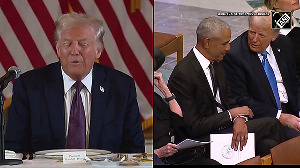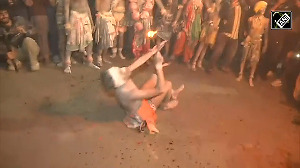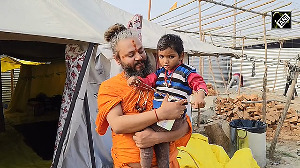When pollsters indicated, in the week running up to the election for Governor of Louisiana, that Piyush 'Bobby' Jindal had likely secured between 12-14 per cent of black votes; incumbent Governor Mike Foster, Jindal's mentor, saw that as an omen.
Referring to his own election, for a second term, in 1999, Foster pointed out that on that occasion, he had swept the primaries with a stunning 62 per cent of the total votes polled; however, he had managed only four per cent of the black votes.
Deriving from this, Foster made the point that Jindal could count on the Republican votes that had ensured his own win; the fact that he had managed to get more support from the black community would weigh further in Jindal's favor in a tight race, Foster argued.
On the day, it did not pan out that way -- while an in-depth analysis must await the complete voting breakdown, even preliminary figures indicate that Blanco secured state-wide support and, further, that this support was overwhelming in the black-dominated regions.
Louisiana is broken up into 4143 parishes, which are clubbed together in 64 cities and towns of varying sizes (seven Congressional districts). A preliminary analysis indicates that of these 64 cities and towns, Jindal managed to gain the majority votes in only 12, as opposed to Blanco who was favored by 52.
Two sets of figures indicate broadly how the race went. In East Baton Rouge (300 parishes), that was seen as Jindal's stronghold, Blanco appears to have energised the Democratic voters into ensuring that her rival did not take too large a lead. The final tally in the region read 70,547 to Jindal, against 62,638 to Blanco -- a lead, for Jindal, of just 7,909 votes in his strongest region.
Compare that with Orleans (442 parishes). Here, in a region where blacks are present in sizeable numbers, Blanco polled 92,746 votes to Jindal's 43,005 -- lead, for the Democrat, of 49,741 votes.
Asked, during the run-up to election day, if the black votes would be key to his chances, Jindal had discarded the notion that skin colour would impact on the results to any degree. "It is not about being black, white or brown," Jindal had said then. "It is about being red, white and blue."
That line -- one of Jindal's favorites, and one he used time and again in course of his campaign -- appears to have been proved false; when the rubber hit the road, the black community -- despite the fact that Ray Nagin, the black Mayor of New Orleans, had endorsed him; and despite the powerful endorsement by Black Organization for Leadership Development (BOLD) -- turned its back on Jindal.






 © 2025
© 2025